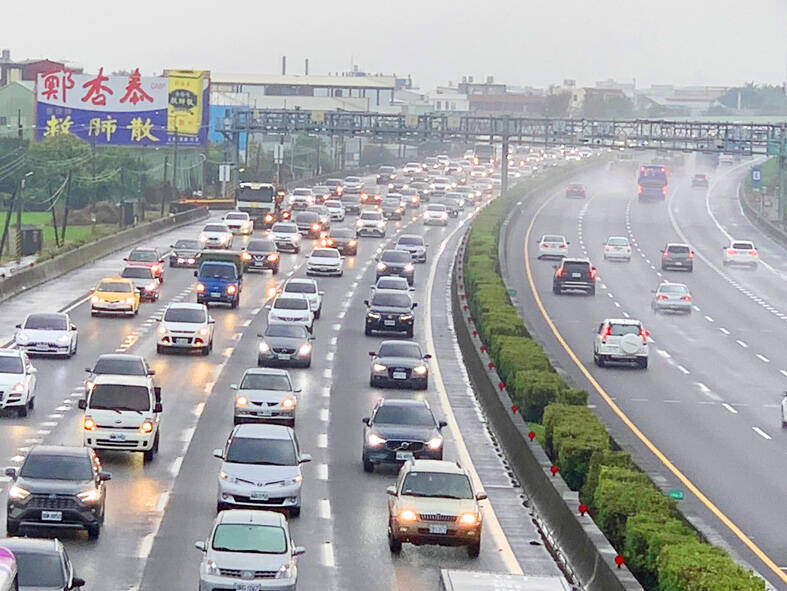The Taiwan Transportation Safety Board yesterday pledged to work with the Ministry of Transportation and Communications to review laws in other countries governing the regulation of self-driving vehicles following a rise in collisions caused by the vehicles, the board’s acting chairwoman Iris Hsu (許悅玲) said at a meeting of the legislature’s Transportation Committee.
Democratic Progressive Party (DPP) Legislator Hsu Chih-chieh (許智傑) said that 36 incidents of self-driving automobiles colliding with construction vehicles on freeways were recorded in 2021.
Last year, four people died in collisions caused by self-driving vehicles, he said.

Photo: Tang Shih-ming, Taipei Times
Over the past two years, 87 percent of collisions with freeway construction vehicles were caused by vehicles equipped with an advanced driver assistance system, he added.
Although the number of self-driving vehicles in the nation has been rising, laws to regulate them have yet to be drafted, Hsu Chih-chieh said.
“The US, Japan and Germany have already put relevant regulations in place. Taiwan only has the Unmanned Vehicles Technology Innovative Experimentation Act (無人載具科技創新實驗條例),” he said.
“Should we not identify laws that should be in place and establish a mechanism to investigate incidents caused by self-driving vehicles or autonomous buses?” he asked.
The safety board has experts to study self-driving vehicles and should bear some responsibility to regulate them, he added.
The transportation ministry, rather than the safety board, is in charge of regulating self-driving vehicles, Iris Hsu said.
“We have exchanged views on issues related to self-driving vehicles with academic experts. As an independent investigative agency, we cannot be players and referees at the same time… We can work with the ministry to review regulations in other countries,” she said.
Safety board employees appear to spend more time engaging in personal conflicts instead of investigating transportation incidents, DPP Legislator Lin Chun-hsien (林俊憲) said.
Although the board last year investigated nearly 60 marine incidents, it only investigated four aviation incidents, seven railway incidents and three highway incidents, Lin said.
“Despite more people using the highway system than marine transportation, the board investigated so few highway incidents last year because the criteria to launch investigations has been set too high,” he said.
“A highway incident must result in at least three deaths, at least 10 deaths and injuries, or at least 15 injuries to warrant an investigation,” he said.
The US National Transportation Safety Board investigates incidents if they pose “potential systemic risks,” he said.
“We do not see the board publish similar reports. Instead, we are seeing board employees engaging in internal fights by reporting each other’s wrongdoings, which is a waste of taxpayers’ money. The board is allocated a budget of about NT$200 million [US$6.5 million] per year,” he said.
“The agency’s budget plan for the next fiscal year should be subject to stricter scrutiny,” he added.
Lin also criticized the board for being slow to build capacity for investigating incidents caused by self-driving vehicles. As of March 28, 29 freeway construction vehicle collision accidents had been reported, with most of them caused by vehicles equipped with advanced driver assistance systems, he said.
Former safety board chairman Young Hong-tsu (楊宏智) in February resigned following allegations that he visited family members and conducted other private affairs during work hours.

Alain Robert, known as the "French Spider-Man," praised Alex Honnold as exceptionally well-prepared after the US climber completed a free solo ascent of Taipei 101 yesterday. Robert said Honnold's ascent of the 508m-tall skyscraper in just more than one-and-a-half hours without using safety ropes or equipment was a remarkable achievement. "This is my life," he said in an interview conducted in French, adding that he liked the feeling of being "on the edge of danger." The 63-year-old Frenchman climbed Taipei 101 using ropes in December 2004, taking about four hours to reach the top. On a one-to-10 scale of difficulty, Robert said Taipei 101

Nipah virus infection is to be officially listed as a category 5 notifiable infectious disease in Taiwan in March, while clinical treatment guidelines are being formulated, the Centers for Disease Control (CDC) said yesterday. With Nipah infections being reported in other countries and considering its relatively high fatality rate, the centers on Jan. 16 announced that it would be listed as a notifiable infectious disease to bolster the nation’s systematic early warning system and increase public awareness, the CDC said. Bangladesh reported four fatal cases last year in separate districts, with three linked to raw date palm sap consumption, CDC Epidemic Intelligence

US climber Alex Honnold left Taiwan this morning a day after completing a free-solo ascent of Taipei 101, a feat that drew cheers from onlookers and gained widespread international attention. Honnold yesterday scaled the 101-story skyscraper without a rope or safety harness. The climb — the highest urban free-solo ascent ever attempted — took just more than 90 minutes and was streamed live on Netflix. It was covered by major international news outlets including CNN, the New York Times, the Guardian and the Wall Street Journal. As Honnold prepared to leave Taiwan today, he attracted a crowd when he and his wife, Sanni,

Two Taiwanese prosecutors were questioned by Chinese security personnel at their hotel during a trip to China’s Henan Province this month, the Mainland Affairs Council (MAC) said yesterday. The officers had personal information on the prosecutors, including “when they were assigned to their posts, their work locations and job titles,” MAC Deputy Minister and spokesman Liang Wen-chieh (梁文傑) said. On top of asking about their agencies and positions, the officers also questioned the prosecutors about the Cross-Strait Joint Crime-Fighting and Judicial Mutual Assistance Agreement, a pact that serves as the framework for Taiwan-China cooperation on combating crime and providing judicial assistance, Liang